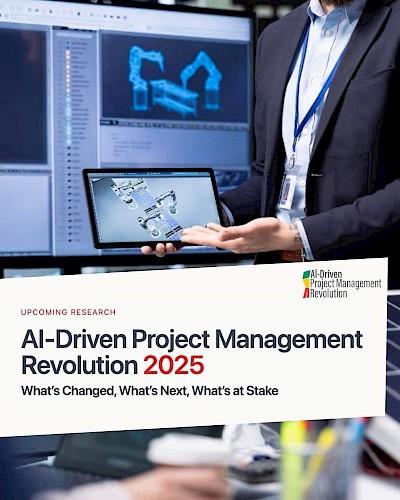Issue #20 - Seu Próximo Membro da Equipe Pode Não Ser Humano
Olá pessoal
Estou de volta com mais uma edição empolgante da nossa newsletter — e esta pode desafiar a forma como você enxerga sua própria equipe.
Este mês, vamos nos aprofundar na ascensão dos Agentes de IA — não apenas ferramentas, mas colaboradores inteligentes que estão remodelando silenciosamente a maneira como gerenciamos projetos. De casos de uso reais com NotebookLM, LangChain, Crew AI e Manus, aos óculos futuristas de IA do Google e ao estúdio de vídeo de última geração da HeyGen, exploramos como o kit de ferramentas do gerente de projetos está evoluindo rapidamente.
Também estamos comemorando grandes marcos: mais de 400 profissionais agora certificados pela nossa Masterclass de AIPM, um novo curso sobre Valor Agregado e o lançamento da nossa pesquisa global sobre IA em gerenciamento de projetos.
Além disso, com as eleições para o conselho do PMI em andamento, é um momento poderoso para refletir sobre o futuro que estamos construindo — juntos.
Então, tome um café, inspire-se e vamos explorar como o próximo membro da sua equipe... pode não ser humano.
Boa leitura!
Ricardo

In This Issue
- Why AI Agents Are Quietly Becoming Part of Your Team
- Leveling Up Your Courses Using HeyGen’s AI Studio
- Google’s New AI Glasses: A Glimpse Into the Interface of the Future
- PMI Board Elections: Shaping the Future of Our Profession
- Launching Our Global Research on AI in Project Management
- 400+ Certified and Growing: AIPM Masterclass Expands Globally
- My New Course: Mastering Earned Value Project Management
Why AI Agents Are Quietly Becoming Part of Your Team
Today, I’d like to start this newsletter with a question:
What if the most efficient, tireless, and scalable member of your project team... wasn’t human?
It might sound like science fiction. But for those of us closely tracking the evolution of AI in project environments, this is no longer theoretical.
It's unfolding, quietly, right beneath our workflows.
That’s the reality behind what I call AI Agents — a new generation of intelligent systems that don’t just assist, but plan, reason, and act across multi-step tasks.
They’re not widgets. They’re not plugins. They’re synthetic collaborators with capabilities that stretch far beyond simple automation.
Let’s be clear: this is a fundamental shift.
They can draft documents, build reports, simulate risk plans, and evolve with your process — not in isolation, but in sync with your goals.
I recently explored this exact topic in an episode of my 5 Minutes Podcast.
In it, I break down how AI Agents are reshaping project management — not by replacing us, but by redefining our role.
I talk about tools like NotebookLM, LangChain, Crew AI, and Manus, and how they’re enabling agents that go beyond automation.
These are agents that can draft emails, update schedules, monitor risks, and generate reports — all while integrating seamlessly with platforms like Trello, Notion, Slack, and Google Docs.
Let me share a bit more about each of them.

NotebookLM is an AI-powered tool by Google designed to help users manage and interact with their personal knowledge base more intuitively.
By uploading documents, notes, and files, NotebookLM allows you to ask natural language questions, get summaries, and extract key information from your materials quickly, turning unstructured notes into actionable insights.
Here’s a small practical tip to get started:
Try using NotebookLM to upload your project documents and meeting notes, then ask it questions like “What are the main risks identified last quarter?” or “Summarize action items from last week’s meeting.” This saves hours of manual review.
Just be mindful of what you share. Make sure you anonymize all information and get the right approvals if you are using your company information.

LangChain is a development framework that helps build applications powered by large language models (LLMs).
It allows developers to create complex AI workflows by chaining together multiple calls to LLMs and integrating them with external data sources or APIs.
This enables building AI agents capable of multi-step reasoning and actions, bridging simple prompts with advanced task automation.
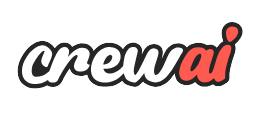
Crew AI is an AI platform focused on helping teams automate workflows by creating intelligent agents that can manage tasks such as scheduling, document drafting, and risk assessment.
It emphasizes easy integration with existing collaboration tools and adapts dynamically to project needs, making AI-driven task management accessible for project teams.

Manus is one of my favorite AI tools. It is a platform that enables building and deploying AI agents tailored to specific business processes.
It combines natural language understanding with orchestration capabilities, allowing agents to perform complex sequences of actions—like email drafting, report generation, and real-time monitoring—across different software tools, effectively becoming digital teammates.
If you’re curious about what it really means to become an AI orchestrator, I invite you to listen to my 5 Minutes Podcast episode called “The Rise of AI Agents in Project Work” here:
An AI Agent can take instructions like:
“Create a slide deck, write the accompanying brief, and extract the financials from our last Q2 report.”
And then actually do it. All three.
Not in three different tools. Not requiring three separate prompts. But in one seamless, intelligent interaction — navigating across platforms, making contextual decisions, and delivering a cohesive, high-quality output.
We’ve moved past the age of narrow prompts and into something far more powerful: delegation at the level of intent, not just instruction.
In my recent Office Hours, and again in my latest LinkedIn Learning course, Revolutionizing Project Management with AI Agents, I break this down in detail.
If you want to assist the live session to learn some practical examples of how you can use AI Agents, and with which tools. you can do it here:
Agents aren’t software. They’re synthetic collaborators that understand, plan, and adapt.
And this isn’t just happening in experimental labs or niche tech teams.
According to the Wall Street Journal, these agents are already being integrated into compliance, tax, and audit services, with some teams reporting productivity gains of up to 80% in routine workflows.
Deloitte also predicts that in 2025, 25% of companies that use GenAI will launch Agentic AI pilots or proofs of concept, growing to 50% in 2027.
Microsoft has integrated AI-powered features into Microsoft Teams, such as the Intelligent Recap, which automatically generates meeting summaries, identifies key discussion points, and suggests action items. This functionality enhances collaboration by providing concise and organized recaps, enabling teams to stay aligned and efficient.
This kind of transformation isn’t just about speed. It’s about strategic capacity.
When AI Agents handle low-level processes, human talent is freed up to lead, guide, and innovate. And that’s where we, as project leaders, must now focus.
This changes everything — not suddenly, but structurally.
For example, in my opinion, the PMO won’t be replaced. But it will be redefined.
Risk planning, procurement mapping, stakeholder reporting, technical documentation — these are already being handled, in part, by AI Agents. What happens when these agents are faster, more reliable, and always on?
The future of project management won’t be about doing more — it’ll be about thinking better.
That means shifting our role from tracking progress to shaping direction. From managing tasks to managing change.
So no, your next colleague might not join the happy hour. But they might be the one who synthesizes 12 documents overnight and sends you a draft that’s 80% done — with sources, formatting, and a risk analysis baked in.
We’re entering a phase of high-leverage transformation.
AI Agents will challenge our assumptions, rewire our processes, and redefine the boundaries of what it means to manage a project.
If you want to learn more about this topic, I created the LinkedIn Learning course. That’s why I keep bringing this conversation to conferences and podcasts. Because if you’re in project leadership today, you can’t afford to ignore what’s quietly becoming part of your team.
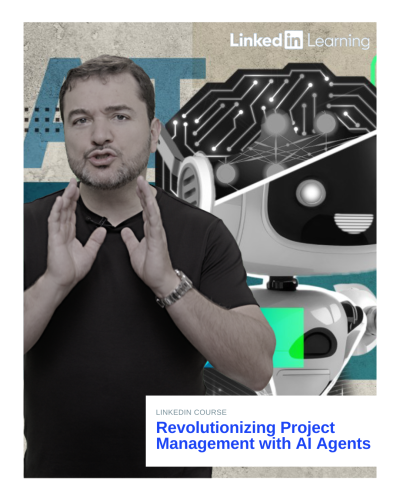
Stay sharp. Stay curious. This isn’t the AI future.
This is the new normal.
What Has Been on My Radar Recently?
Leveling Up Your Courses Using HeyGen’s AI Studio
One of the most exciting things I’ve been experimenting with lately is using tools like HeyGen’s AI Studio to help structure and deliver educational content, effortlessly.
HeyGen launched new features that allow users to create hyper-realistic AI avatars, voice clones, and studio-quality video presentations using only text inputs. This is more than a video generator — it’s a full-fledged synthetic media platform that’s about to transform how we create internal training, PMO updates, and even full project courses.
Imagine taking a stream of ideas, posts, podcasts, and research, and turning them into a structured course with learning outcomes, modules, and video lectures, all without needing a camera or editing suite.
You can now create complete learning content using your own avatar, narrate complex project updates, or onboard new team members using dynamic AI video, directly from HeyGen.
HeyGen and similar tools allow you to not just curate content, but intelligently organize and present it as cohesive multimedia learning paths, making knowledge transfer faster, smarter, and more scalable.
Google’s New AI Glasses: A Glimpse Into the Interface of the Future
During the recent Google I/O event, one of the most groundbreaking announcements came in the form of AI-powered augmented reality glasses, developed in collaboration with Samsung:
These glasses aren’t just wearable tech — they’re a bold step toward fully integrated, intelligent user interfaces.
The device brings together contextual memory, real-time translation, on-device reasoning, and seamless integration with your smartphone.
What’s revolutionary is its ability to process what you're seeing, hearing, and asking in real time.
In one demo, a young girl looks at a book and casually asks a question about it.
That interaction symbolizes more than convenience — it signals the dawn of an era where technology fades into the background and experience takes center stage.
For project managers and innovators, this isn’t just about gadgets — it’s about the emergence of ambient, embodied computing that could drastically reshape how we collaborate, learn, and manage information.
The interface is evolving — and it's becoming invisible.
PMI Board Elections: Shaping the Future of Our Profession
PMI Board Elections: Shaping the Future of Our Profession
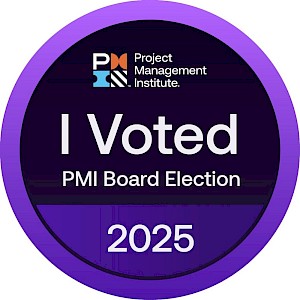
And after 29 years as a Project Management Institute member, former Chairman of the Board, and a proud PMI Fellow, I can tell you: this moment still gives me immense joy.
Leadership renewal in our professional community isn’t symbolic — it’s strategic. PMI is shaped by its members. And that means our votes, our choices, and our voices matter.
If we want project management to remain bold, inclusive, and globally relevant, we need to participate — not passively observe.
You can meet the candidates here:
That’s why I’m encouraging all my peers in the PMI community:
Make your voice count. Vote.
Because the future of our profession is not written by algorithms — it’s written by us.
Quick Announcements
Launching Our Global Research on AI in Project Management
I’m thrilled to share that Antonio Nieto-Rodriguez and I are launching a new global research initiative: AI-Driven Project Management Revolution 2025 — What’s Changed | What’s Next | What’s at Stake.
This is a free and open survey for project professionals everywhere — across industries, roles, and regions — whether you're already using AI tools or just starting to explore their impact.
The goal is to understand how AI is transforming project management in the real world — and what it means for your career, your team, and the future of the profession.
All results will be published and shared freely with the community — no paywall, no gatekeeping.
Because we believe in open knowledge that empowers better project leadership.
To thank you for completing our survey on AI in Project Management, we’re giving away two free spots in our AI Masterclass in July 2025. All respondents who opt into the drawing will be entered for a chance to win.
Click the image below to take the survey.
The more voices we gather, the more valuable this research becomes.
So please share it, participate, and help us shape the next phase of AI-driven project leadership.
400+ Certified and Growing: AIPM Masterclass Expands Globally
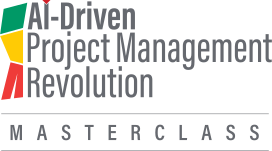
Antonio Nieto-Rodriguez and I are excited to share a major milestone for our global AI in Project Management movement: We’ve officially surpassed 400 AIPM-certified professionals!
This marks a powerful moment in our journey to prepare project leaders for an AI-enabled future.
Co-created with APMG International, the AIPM Certification equips you to apply AI concepts, integrate intelligent systems into project workflows, and lead with clarity in a rapidly evolving digital environment.
But the big news doesn’t stop there…
We’ve just signed with two new ATOs (Accredited Training Organizations):
- PROVEK, delivering AIPM in the United Kingdom
- QRP International, now our official partner in Southern Europe
These partnerships will expand our global reach and make the AIPM experience accessible to even more professionals across borders.
And more are coming soon — including new training partners in China, Latin America, and other key regions.
This is a sign of the growing momentum and demand for future-ready project leadership skills.
Next AIPM Masterclass – 8th Edition: July 29–30, 2025
Learn more or register here.
Thank you to everyone who has joined, shared, or supported this mission. Together, we’re building the future of AI-powered project leadership.
My New Course: Mastering Earned Value Project Management
One more exciting thing — A new project is born! My new course on Earned Value is now live!
This is one of the most requested topics from the community, and I’ve built it with a focus on clarity, hands-on practice, and real-world application.
The course is a reflection about how we approach scheduling and budgeting, aiming to assess true performance.
In this course, I share the core principles of Earned Value Management, including practical tools to apply EVMS in real projects using Microsoft Project and Monte Carlo simulations.
You’ll also learn advanced forecasting methods and how to make smarter strategic decisions by choosing the right indices for different types of project approaches and methods.
I am suspicious of talking about this topic because earned value is at the center of my master's thesis, and several of my works support construction companies and other contractors delivering infrastructure projects. For me, it is one of the most powerful tools we can use to track performance.
In the course, my goal is to help you build true mastery of Earned Value, so you can boost project accuracy, efficiency, and success with confidence.
The course is available at my online school, and it is presented in English, with subtitles available in English, Brazilian Portuguese, French, Spanish, Arabic, and Simplified Chinese.
To celebrate this milestone, the course will be, for a limited time, with 50% discount (from $99 to $49.50) using the coupon EVMS.
You can also buy the bundle Earned Value + PMBOK Guide 7th Edition with $140 discount (from $338 to $198) and the bundle Earned Value + PMBOK Guide 6th Edition with $80 discount (from $198 to $119). Use the coupon EVMS on both.
I can not forget to mention that most of the net results of the Online School go back to the community in scholarships for those who can not afford it. Since its creation, we have distributed over 180 scholarships in 41 countries.
A big thank you to the fantastic crew who produced the course! You are outstanding!
Check the course here. And check the four free classes on my YouTube channel, here.
I can’t wait to see how you transform your projects with these skills!
Let’s keep learning, evolving, and pushing the profession forward — together.
Your Voice Matters!
You can also read the previous issues here.
If you have any suggestions, comments, or anything else that will help me make it better, please send a note to [email protected]
Please feel free to share this newsletter with your friends, colleagues, and other people you may find will benefit from it.
They can also subscribe to receive it here.
Thanks for your support, and I hope it was helpful to you.
Cheers,
Ricardo Vargas





